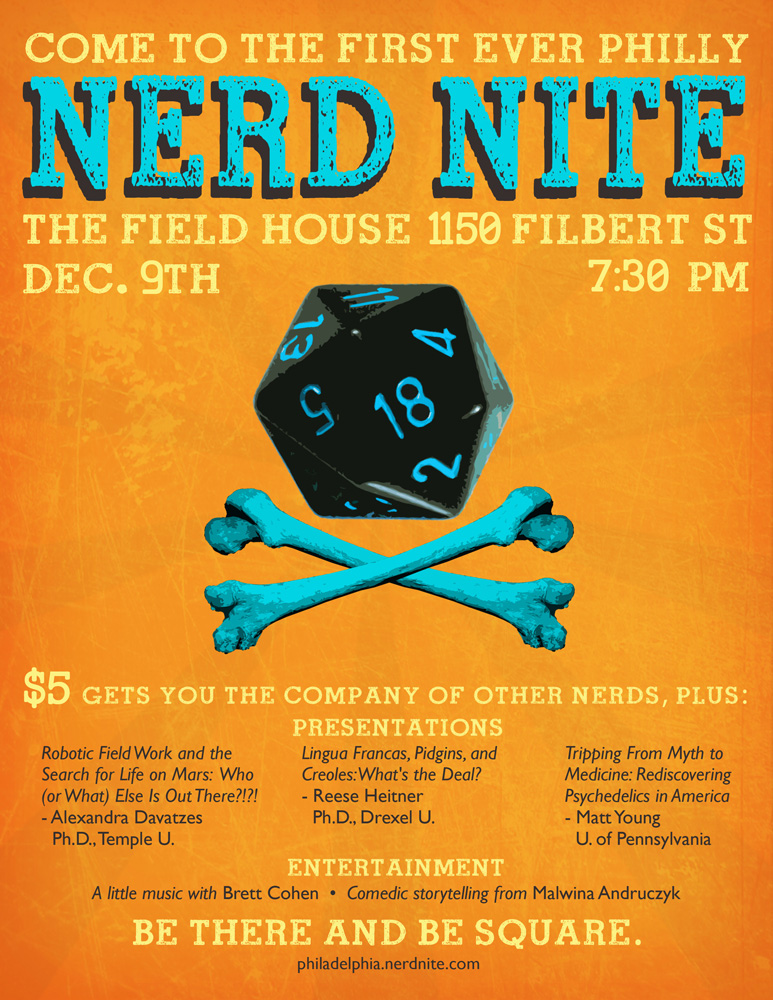Philly Nerd Nite No. 1, December 9, 2010
nerd nite philadelphia #1
Thursday, December 9th, 7:30PM (doors), 8:00PM (show)
The Field House, 1150 Filbert Street (at 12th St, one block north of Market)
$5 cover gets you cheap drinks and 60 minutes of pure nerdom.
The inaugural Nerd Nite Philadelphia will feature a smorgasbord of science and culture. We’ll hear about searching for life on Mars, the development of regional languages and psychedelics in America. In addition to nerdy lectures, we’ll feature local musical and comedy talent and stupid nerd tricks. If you pay attention, you could leave Nerd Nite an expert on three new topics and a have a few new jokes in your arsenal!
Alexandra Davatzes, Temple University
Robotic field work and the search for life on Mars: who (or what) else is out there?!?!
Meteorite impacts to the Earth were larger and more frequent early in its history, just when the first life forms on Earth were evolving. What effects did these impacts have? More importantly, what do they tell us about extra-terrestrial life, and will we find it on Mars?
Bio:
Alix Davatzes is a planetary geologist at Temple University where she looks at pretty pictures of Mars and contemplates the effects of a meteorite hitting the Earth with 7 orders of magnitude more energy than the Hiroshima or Nagasaki bombs. Then she goes home and deals with two children that have 10 orders of magnitude more energy than the bombs.
Reese Heitner, Drexel University
Lingua Francas, Pidgins, and Creoles: What’s the Deal?
Linguistic diversity, like bio-diversity, comes in many flavors. Languages can be historically arranged via common ancestry (e.g., Latin-based Romance languages), but equally, languages can also be typologically arranged via common structures (e.g., SVO languages like English and Mandarin). But some languages have their distinctive taste in virtue of their unique sociolinguistic role and origin. The similarities and differences among lingua francas, pidgins, and creoles are sampled and compared.
Bio:
With converging interests in language, learning, and cognitive psychology, Prof. Heitner teaches the undergraduate linguistics courses in the Drexel Department of Culture and Communication as well as graduate TESL courses for the Drexel School of Education. Prof. Heitner also teaches a number of advanced ESL courses at the English Language Center at Drexel University.
Matt Young, University of Pennsylvania
Tripping From Myth to Medicine: Rediscovering Psychedelics in America
For some seven-thousand years human beings have been entangled in a peculiar relationship with psychedelic plants. We’ve worshiped and demonized them, used them to heal and to harm, and, under their tutelage, been shown within ourselves great beauty and darkness. Now, after fifty years in exile, the psychedelic plants are being revisited in the Western world as useful in the treatment of psychiatric ailments. As we once again test the waters of a relationship with these plants, let us look at that relationship in the past, present, and future; to the mysteries we’ve unraveled about that relationship, and to those that remain delightfully cloistered.
Bio:
I am a doctoral candidate in neuroscience at the University of Pennsylvania. At this time, my research interests lie in understanding how the brain uses emotion to signal the significance of learned information so that it may be more vividly recalled in the future. I grew up in Arizona where a wide array of influences — raised in a Jewish home by a Navajo father, graduated from a Catholic high school, a student of psychology and Eastern traditions at Arizona State University — that shaped my fascinations and worldview. It is my hope that science and humanism can meet somewhere in our conscious space for the betterment of this planet.
Featuring:
Comedic storytelling by Malwina Andruczyk.
Malwina is an immigrant from Poland. She has seen Barbara Streisand’s “Funny Girl” and can really relate.
And a little music with Brett Cohen.
Brett is a fingerstyle guitarist and singer.
Graphic design by Jon Oliver.
